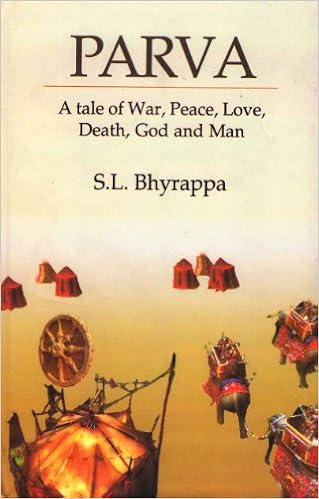
I have stayed connected with Mahabharata all through my life – Bedtime stories from my Dad, Harikatha stories in my village temple, various television series on TV. I am an avid reader yet I never picked a written version of the epic. Not because of the sheer volume but because I was tired of the magical elements attributed to the story. I am a person who looks for a scientific and rational explanation for everything and finally, I found it in this book.
Parva is a retelling of the epic of Mahabharata written using monologue technique from the perspective of various characters. Author S L Bhyrappa strips of the godly and pious elements associated with the characters of the story and by doing so actually make them relatable. Such retelling may not be acceptable for religious people who are filled with reverential fear of ‘bhakti’ for the Gods.
The author’s retelling comes out as rational and realistic because of his profound research and presentation of Geography, various tribes, cultural practices, and the transition these practices would have gone through.
The culture and mindset of people go through a transition over a period of time. For instance, polygyny is mostly going out of practice these days. Future generations might frown upon it while it was a common practice in past generations. Even, Polyandry can be looked at from the same perspective. I always believed that Polyandry would have been an approved practice during the Mahabharata period, however, when authors told the story at the time of their writing, they tried to justify the practice (so that readers of their time won’t frown upon it) by adding elements like passing through fire and regaining virginity. During my travel to some parts of Kerala and Ladakh, I came across history wherein Polyandry continued until recent times.
The same is with ‘Niyoga’ practice. S L Bhyrappa provides a plausible rational explanation for this. No, children were not born as magical gifts from Gods. They were born through the natural method of procreation.
It is the same with the story of the hundred Kauravas. Gandhari did not give birth to all hundred of them but many of the Kauravas were born to servant maids of Gandhari. There are many children born out of wedlock between Kings and servant maids and these people comprise the Suta community. The author subtly presents what the caste system is and the major differences. The author does not hide from presenting the roots of patriarchy, power politics, and objectification of women.
By choosing to present the story as a narration by various characters like Shalya and Yuyutsu and not just the main characters like Arjuna, Draupadi, and Kunti, the author gives us a full spectrum of the story. The storyline starts with a stage set for the war and leaps in narration from one character to another as the characters dwell on the past events that led to the present-day war. This makes the narration fascinating even though it is mostly a monologue. As the character analyses the situation from their frame of reference we get to know in detail the epic itself from all the characters involved and not just the Kauravas, Pandavas, or Krishna.
A detailed explanation of terrain, heat, clothing, house structures and layouts, and the food consumed by the people show the extensive research efforts put in by the author.
The central theme of discussion still remains – what is DHARMA?
The book is named Parva: A tale of war, Peace, Love, Death, God, and Man, and the author covers all these elements listed extensively in the book. Minute elements like the attitude and ignorance of soldiers during the war, their affiliations, and basic requirements. Efforts of people like Vidura who work towards establishing peace and failed efforts and predicaments of Bhishma and Drona. Only Krishna comes out as a person with a clear perspective on what is Dharma. Krishna is projected as a person with intelligence, a smart politician and planner, and a person who works towards establishing Dharma in the land. He is a human with good qualities, you need not be a God to do all these. Story of Love is presented in multi-dimension. For example, how could Draupadi love her five husbands equally, or did she? How did love transition and change with circumstances?
The author even raises excellent questions on Vedas and death as a discussion between Vyasa’s disciples. However, I felt that author left loose ends in these. On the other hand, the author goes overboard and tends to be repetitive when it comes to nitty-gritty details of heat, unavailability of food, sanitation during the war, and ritual practices.
Overall, Parva is an epic retelling and a job well done at that. A reproduction of a massive epic by humanizing the characters and situations is marvelous. Parva will remain a masterpiece as it does not present mythical characters but human personalities that face love, lust, anger, greed, jealousy, and dharma. It goes into the deep and dark secrets of the human psyche and leaves you thinking.